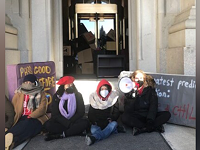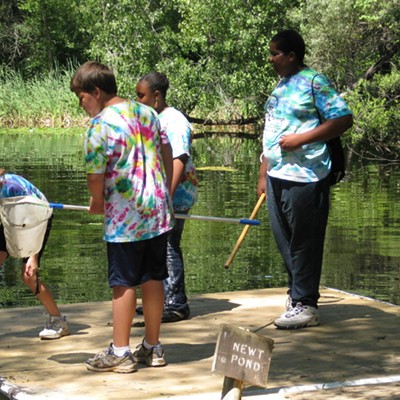
[
{
"name": "500x250 Ad",
"insertPoint": "5",
"component": "15667920",
"parentWrapperClass": "",
"requiredCountToDisplay": "1"
}
]
The confirmed cases of coronavirus in Monroe County are growing exponentially, as they have around the globe, and that means life as we know it has changed and will keep changing as we attempt to limit the scourge of this pathogen. Call it the new normal of COVID-19.
By the end of last week, local arts and cultural institutions had shut down, colleges and public schools closed their campuses and moved to online learning, and large events like the St. Patrick’s Day Parade were canceled.
By Sunday, the Centers for Disease Control and Prevention issued a recommendation that all gatherings of 50 people or more be canceled, including conferences, parades, sporting events, and, well, you name it.
On Monday, Governor Andrew Cuomo ordered all restaurants and bars to close and shift to take-out and delivery only, and directed gyms and movie theaters to shutter.
 Life as we know it is changing so quickly that by the time this article makes it onto the printed page, there will no doubt be more disruptions to our daily routines.
Life as we know it is changing so quickly that by the time this article makes it onto the printed page, there will no doubt be more disruptions to our daily routines.
Few things are certain. But what is guaranteed is that we’re each facing varying levels of isolation. The coming days, weeks, months will be marked by self-imposed and involuntary quarantines and the new concept of “social distancing,” a term health agencies coined to tell people to avoid crowds and keep a healthy distance from one another.
More people are going to work from home and — once the panic buying slows down or stops — fewer people will be out in restaurants and stores.
The new normal of COVID-19 will, for many people, take a mental toll. It will introduce new stresses into everyone’s lives. Humans are social creatures used to greeting each other with handshakes and hugs, gathering together for all sorts of reasons, and interacting face to face.
“We invite friends over for dinner after work, we go out to meet other people,” said Dr. George Nasra, a professor of clinical psychiatry at University of Rochester Medical Center. “We engage in social activities to distract ourselves, to decrease stress, to manage our own anxiety, but also to belong — to feel that we belong, that we’re not alone.”
If people can’t do that, Nasra adds, they lose stress relievers and may look for unhealthy substitutes, such excessive food and alcohol consumption.
For folks who find themselves spending more time at home, away from crowds and friends, there are some red flags to watch out for and some important steps they can take to minimize the stress and anxiety of these uncertain times.
“A quarantine situation, the first thing it does, it disrupts our usual routine so we have to create our own (new routines),” Nasra said.
That means, among other things, getting up and going to bed at set times and creating some activities throughout the day, he said. Much of his guidance isn’t much different from the advice veteran telecommuters give to people who are new to working from home.
Families, who now will have parents working from home and children who won’t be leaving for school, would also benefit from recreating routines as much as they can.
“Routine is everyone’s friend,” Dobbin said.
She added that laying out clear ground rules can help families and households avoid conflict, since doing so helps clarify expectations. Clear, agreed-upon rules about things such as screen time or how work around the house is going to be divided also help in the event of a disagreement, since they provide a starting point for a discussion.
“There’s so much uncertainty coming from all sides, to the extent that we can create our own, predictability is important,” Dobbin said.
But even people who are quarantined have options, experts said, especially given the prevalence of technology in many of our lives.
“It’s very important not to be idle in this situation, not to be just sitting there, doing nothing, listening to the news and waiting for some kind of doom and gloom scenario to happen,” Nasra said.
For many people, work or classes will be among their activities. Nasra also advises working in some time to connect with family and friends as well as making sure to pay attention to pets, including walking your dog if you aren’t under quarantine or have been cleared to do so. He also recommended making time for some sort of physical activity.
Social media sites have countless posts where people are sharing online yoga and other home exercise classes. They’re also sharing virtual museum visits, podcast recommendations, and other suggestions for keeping busy.
Kristen Seversky, a product owner at Paychex, sees video gaming as a place people can turn to clear their minds. A good game can be absorbing and mentally challenging, which helps time pass without it feeling wasted.
As the collective anxiety around COVID-19 ramped up, she asked on Twitter what games would help people endure a quarantine. The responses ranged from sprawling video games like Civilization, Sims, and Minecraft, to the time-honored jigsaw puzzle.
“Games take on a lot of shapes and sizes, especially in VR where they do painting and artistic-type things where you’re immersed in art,” Seversky said. “You can be mindful, you can just be relaxed and calm, just get into a different world for a bit. You don’t have to connect, you don’t have to be doing some war or battle or strategy. It could just be you with you.”
Seversky also said that lots of apps and games for children have an educational focus, making them a good option for parents to check out. She noted that Rochester’s Second Avenue Learning produces games with a math and STEM focus.
WXXI’s Education Outreach Center has also published a list of free educational apps for children, which is available at bit.ly/wxxikidsfreeapps. WXXI Public Media is the parent company of CITY.
Nasra urges people to use video calling services like Apple’s FaceTime to stay in touch with people close to them and to reach out to friends and family who are in quarantine. Scheduling calls helps with a sense of routine, he said.
Dobbin adds that parents can use video calling services to set up virtual playdates for their children and give them more face time with people they care about. Or, in the tradition of pen pals, they can arrange for friends to e-mail each other back and forth.
“A lot of stress and conflict ultimately could be stemming from not getting enough connecting, not feeling close to friends,” Dobbin said.
Zoom has received a lot of attention recently for opening up its video conferencing service to more users for free. Spectrum is offering two months of free internet access to households with K-12 students or college students, provided they don’t already have service.
Seversky, who described herself as an extrovert, said she likes the idea of friends playing board games over video chat services such as FaceTime, Skype, or Zoom. Video games, especially online multi-player ones like World of Warcraft, can also serve as an outlet for socialization.
She used to bond with coworkers after hours by playing as a six-person unit in Overwatch, a team-based shooter game.
“To me, it’s the same,” Seversky said. “Virtual or not, if you’re just talking, communicating, and learning about each other then I don’t see how it’s different,” Seversky said.
“We’re still together, we’re just not in person,” Seversky later added. “That’s fine.”
If those symptoms come and go with little disruption, that’s one thing.
“When they start to interfere with our daily life, that’s when we should be concerned,” Nasra said. “When we start, for example, becoming more irritable, short-tempered with other people; when we are not able to get a good night’s sleep; when we find that we are having nightmares; when we are not able to focus and concentrate on daily activities.”
It’s crucial for people in quarantine to monitor their mental state, but it’s important for everyone else to do so, too. Nasra encourages people to listen to others if they express concerns about their well-being.
“Sometimes you are not the best judge,” Nasra said. “So if we hear feedback from loved ones or family members who say you’re not yourself, to take that seriously.”
Anyone who is feeling stressed or anxious should take advantage of their workplace’s employee assistance plan (EAP) if they have one, Nasra said. Those services typically can direct people to tele-health counseling. Many therapists and medical professionals also offer tele-health appointments.
Nasra also has some advice — which may be a little tough to swallow — about what not to do. He cautions people to avoid increasing their alcohol consumption or turning to unhealthy food to relieve stress. Both can have damaging effects on health and well-being.
Some will struggle with the appropriate way to supervise teenagers who are now at home with lots of unstructured time ahead of them. Others will have to strike a balance between parents who need to work from home and to care for younger children, or adult children who need to care for aging parents. Many households will face the stress that comes with a loss of income.
“As your own emotions mount it can be harder to then deal with, on top of that, the relational strain of being in situations that aren’t usual for your family,” Dobbin said.
She added that signs of looming conflict could range from general irritability among members of a household to teenagers acting out. Parents may feel anxious and desperate to get out.
She advises parents and family members not to let conflict bubble up, and to try to address points of friction early. Structure, routine, and established ground rules can help prevent conflict, too.
If families are having difficulty working through problems, Dobbin recommends reaching out to a licensed family therapist, many of whom offer tele-health appointments.
Dobbin also notes that parents and children may also be disappointed, sad, or angry about cancelled travel plans and cancelled sporting events or other activities. Families should make space for those feelings.
“You don’t want to encourage kids to bury all of that,” Dobbin said. “You kind of want to let them feel what they’re going to feel about it and be like ‘Yeah, it’s really disappointing.’”
Jeremy Moule is CITY’s news editor. He can be reached at [email protected].
By the end of last week, local arts and cultural institutions had shut down, colleges and public schools closed their campuses and moved to online learning, and large events like the St. Patrick’s Day Parade were canceled.
By Sunday, the Centers for Disease Control and Prevention issued a recommendation that all gatherings of 50 people or more be canceled, including conferences, parades, sporting events, and, well, you name it.
On Monday, Governor Andrew Cuomo ordered all restaurants and bars to close and shift to take-out and delivery only, and directed gyms and movie theaters to shutter.
Related Cuomo orders food and drink establishments to move to take-out and delivery only

Cuomo orders food and drink establishments to move to take-out and delivery only
The announcement comes as the number of confirmed COVID-19 cases climbs statewide.
News
Few things are certain. But what is guaranteed is that we’re each facing varying levels of isolation. The coming days, weeks, months will be marked by self-imposed and involuntary quarantines and the new concept of “social distancing,” a term health agencies coined to tell people to avoid crowds and keep a healthy distance from one another.
More people are going to work from home and — once the panic buying slows down or stops — fewer people will be out in restaurants and stores.
The new normal of COVID-19 will, for many people, take a mental toll. It will introduce new stresses into everyone’s lives. Humans are social creatures used to greeting each other with handshakes and hugs, gathering together for all sorts of reasons, and interacting face to face.
“We invite friends over for dinner after work, we go out to meet other people,” said Dr. George Nasra, a professor of clinical psychiatry at University of Rochester Medical Center. “We engage in social activities to distract ourselves, to decrease stress, to manage our own anxiety, but also to belong — to feel that we belong, that we’re not alone.”
If people can’t do that, Nasra adds, they lose stress relievers and may look for unhealthy substitutes, such excessive food and alcohol consumption.
For folks who find themselves spending more time at home, away from crowds and friends, there are some red flags to watch out for and some important steps they can take to minimize the stress and anxiety of these uncertain times.
Have a routine
Experts including Nasra and Stephanie Vail Dobbin, a licensed marriage and family therapist whose practice is in the Neighborhood of the Arts, emphasize that structure and routine are essential to fighting increased isolation, and it’s critical for people who are quarantined or self-isolated.“A quarantine situation, the first thing it does, it disrupts our usual routine so we have to create our own (new routines),” Nasra said.
That means, among other things, getting up and going to bed at set times and creating some activities throughout the day, he said. Much of his guidance isn’t much different from the advice veteran telecommuters give to people who are new to working from home.
Families, who now will have parents working from home and children who won’t be leaving for school, would also benefit from recreating routines as much as they can.
“Routine is everyone’s friend,” Dobbin said.
She added that laying out clear ground rules can help families and households avoid conflict, since doing so helps clarify expectations. Clear, agreed-upon rules about things such as screen time or how work around the house is going to be divided also help in the event of a disagreement, since they provide a starting point for a discussion.
“There’s so much uncertainty coming from all sides, to the extent that we can create our own, predictability is important,” Dobbin said.
Find things to do
Part of building a routine or schedule is filling it with stuff. The trouble now is that time-honored stuff — like going to the gym or carving out time for a glass of wine with a partner at a restaurant — are no longer options.But even people who are quarantined have options, experts said, especially given the prevalence of technology in many of our lives.
“It’s very important not to be idle in this situation, not to be just sitting there, doing nothing, listening to the news and waiting for some kind of doom and gloom scenario to happen,” Nasra said.
For many people, work or classes will be among their activities. Nasra also advises working in some time to connect with family and friends as well as making sure to pay attention to pets, including walking your dog if you aren’t under quarantine or have been cleared to do so. He also recommended making time for some sort of physical activity.
Social media sites have countless posts where people are sharing online yoga and other home exercise classes. They’re also sharing virtual museum visits, podcast recommendations, and other suggestions for keeping busy.
Kristen Seversky, a product owner at Paychex, sees video gaming as a place people can turn to clear their minds. A good game can be absorbing and mentally challenging, which helps time pass without it feeling wasted.
As the collective anxiety around COVID-19 ramped up, she asked on Twitter what games would help people endure a quarantine. The responses ranged from sprawling video games like Civilization, Sims, and Minecraft, to the time-honored jigsaw puzzle.
A pal and I were talking about how time no longer exists when playing certain games, which felt like an opportunity.
— Kristen Seversky (@KR1573N) March 10, 2020
So, Twitter pals, what is your go-to, 14-day, self-quarantined game plan? What games make time fly?
“Games take on a lot of shapes and sizes, especially in VR where they do painting and artistic-type things where you’re immersed in art,” Seversky said. “You can be mindful, you can just be relaxed and calm, just get into a different world for a bit. You don’t have to connect, you don’t have to be doing some war or battle or strategy. It could just be you with you.”
Seversky also said that lots of apps and games for children have an educational focus, making them a good option for parents to check out. She noted that Rochester’s Second Avenue Learning produces games with a math and STEM focus.
WXXI’s Education Outreach Center has also published a list of free educational apps for children, which is available at bit.ly/wxxikidsfreeapps. WXXI Public Media is the parent company of CITY.
Connect with people
As far as connecting to family and friends, people are going to have to get creative. Technology, however, will help people stay connected without getting together in big groups.Nasra urges people to use video calling services like Apple’s FaceTime to stay in touch with people close to them and to reach out to friends and family who are in quarantine. Scheduling calls helps with a sense of routine, he said.
Dobbin adds that parents can use video calling services to set up virtual playdates for their children and give them more face time with people they care about. Or, in the tradition of pen pals, they can arrange for friends to e-mail each other back and forth.
“A lot of stress and conflict ultimately could be stemming from not getting enough connecting, not feeling close to friends,” Dobbin said.
Zoom has received a lot of attention recently for opening up its video conferencing service to more users for free. Spectrum is offering two months of free internet access to households with K-12 students or college students, provided they don’t already have service.
Seversky, who described herself as an extrovert, said she likes the idea of friends playing board games over video chat services such as FaceTime, Skype, or Zoom. Video games, especially online multi-player ones like World of Warcraft, can also serve as an outlet for socialization.
She used to bond with coworkers after hours by playing as a six-person unit in Overwatch, a team-based shooter game.
“To me, it’s the same,” Seversky said. “Virtual or not, if you’re just talking, communicating, and learning about each other then I don’t see how it’s different,” Seversky said.
“We’re still together, we’re just not in person,” Seversky later added. “That’s fine.”
Be aware of your mental state
It’s normal for people to be nervous and anxious right now, Nasra said. Anxiety includes some physical symptoms, such as increased heart rate, feeling on edge, and restlessness.If those symptoms come and go with little disruption, that’s one thing.
“When they start to interfere with our daily life, that’s when we should be concerned,” Nasra said. “When we start, for example, becoming more irritable, short-tempered with other people; when we are not able to get a good night’s sleep; when we find that we are having nightmares; when we are not able to focus and concentrate on daily activities.”
It’s crucial for people in quarantine to monitor their mental state, but it’s important for everyone else to do so, too. Nasra encourages people to listen to others if they express concerns about their well-being.
“Sometimes you are not the best judge,” Nasra said. “So if we hear feedback from loved ones or family members who say you’re not yourself, to take that seriously.”
Anyone who is feeling stressed or anxious should take advantage of their workplace’s employee assistance plan (EAP) if they have one, Nasra said. Those services typically can direct people to tele-health counseling. Many therapists and medical professionals also offer tele-health appointments.
Nasra also has some advice — which may be a little tough to swallow — about what not to do. He cautions people to avoid increasing their alcohol consumption or turning to unhealthy food to relieve stress. Both can have damaging effects on health and well-being.
Address family problems before they bubble up
Every family is different and will have its own unique coronavirus-related challenges and stresses.Some will struggle with the appropriate way to supervise teenagers who are now at home with lots of unstructured time ahead of them. Others will have to strike a balance between parents who need to work from home and to care for younger children, or adult children who need to care for aging parents. Many households will face the stress that comes with a loss of income.
“As your own emotions mount it can be harder to then deal with, on top of that, the relational strain of being in situations that aren’t usual for your family,” Dobbin said.
She added that signs of looming conflict could range from general irritability among members of a household to teenagers acting out. Parents may feel anxious and desperate to get out.
She advises parents and family members not to let conflict bubble up, and to try to address points of friction early. Structure, routine, and established ground rules can help prevent conflict, too.
If families are having difficulty working through problems, Dobbin recommends reaching out to a licensed family therapist, many of whom offer tele-health appointments.
Dobbin also notes that parents and children may also be disappointed, sad, or angry about cancelled travel plans and cancelled sporting events or other activities. Families should make space for those feelings.
“You don’t want to encourage kids to bury all of that,” Dobbin said. “You kind of want to let them feel what they’re going to feel about it and be like ‘Yeah, it’s really disappointing.’”
Jeremy Moule is CITY’s news editor. He can be reached at [email protected].
Speaking of...
-

Mask mandate for New York schools to end Wednesday
Feb 28, 2022 -

Hochul confirms state's eviction moratorium ends Jan. 15
Jan 12, 2022 -

Hochul: COVID-19 winter surge is here
Dec 17, 2021 - More »
Latest in News
More by Jeremy Moule
-

ROCHESTER TEN
ANNETTE RAMOSAug 1, 2023 - More »














